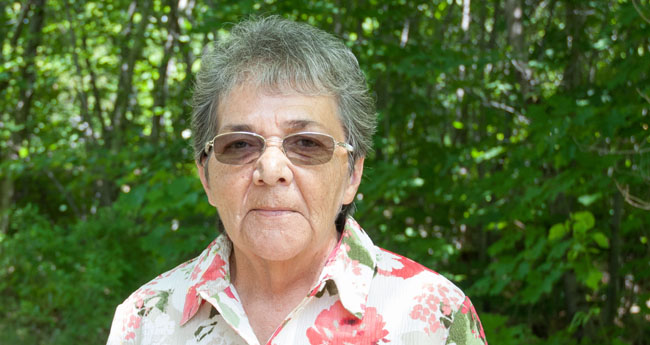Chief Couchie calls for halt to Energy East pipeline project

By Kelly Anne Smith
Chief Marianna Couchie has some last words of wisdom for future generations.
The ecological state of Nipissing First Nation lands has Chief Marianna Couchie calling for a halt to the Energy East pipeline project.
Recently, the National Energy Board included Nipissing First Nation on the list of Aboriginal groups and First Nations that can take part in the application process for the Energy East pipeline.
In an interview for Anishinabek News, Chief Marianna Couchie wanted to make herself quite clear on where she stands on the proposed pipeline.
“A lot of our members are worried about spills/ruptures in our lands and the environmental consequences. We have been ‘granted’ intervenor status on the Energy East pipeline. We do hope that the project will be halted. One only needs to look at what happened in Alberta July 15th where a newly installed pipeline ruptured and the environmental disaster that occurred. We do not want to see this happen across our Territory or other parts of Ontario. This is an old pipeline that was made for gas distribution. Sending the heavier bitumen oil through it is a disaster waiting to happen.”
Lake Nipissing could be contaminated by an Energy East spill but that is not all that has worried Chief Couchie for years about the Lake. As Chief Couchie steps down from office, she educates and has warnings about the walleye fishery.
“Lake Nipissing was originally filled with Blue Walleye. Early in my first term in office, we were doing so much. We were putting a quarter of a million dollars yearly in doing our part to preserve the walleye. I hope people will see the importance of protecting the walleye species. Last season, we closed walleye fishing early. Now there are new regulations with the angling season coinciding with the netting season. There are new nets with bigger holes so that adolescent fish can swim out. And we ask people not to spear, because those are the spawners. I do hope with these efforts and with the rebranding of the lake, the walleye are protected.”
The chief started the Lake Nipissing Summit to unite all the community leaders on the shores of Lake Nipissing. “We signed a stewardship agreement to protect the lake and I’d like to see that summit continue.” Chief Couchie says eco-tourism involving trail development to provide hiking opportunities has to be promoted as well as water sport opportunities like kayaking and canoeing.
Chief Couchie talked of the many positive changes for Nipissing First Nation under her leadership.
“The negotiated land claim was very good for prosperity for our First Nation. The government started off with an offer of 65-million dollars. Right away we said no to that offer. The credit for that land claim settlement really should go to Joan McLeod, our Lands Manager. The amount of research she did on that land claim was phenomenal. Every time we would go to Ottawa, we would meet with the negotiators and they would add a few more million. Then the final offer was $123.9 million dollars. Everyone received the per capita distribution of $20-thousand dollars. We have invested $83-million dollars. We continue buying original lands back where we can.”
During her time in office, Chief Couchie has been a staunch protector of Nipissing First Nation rights, overseeing a constitution written to guarantee the band’s Treaty rights. Gichi Naaknigewin became law in January 2014.
Another project Chief Couchie is proud of is the new solar panels on Nbissing Secondary School. The Chief says the band is working to have the energy generated into a sound investment. “I would have liked to see the energy wired to homes here.”
The Chief talked about other improvements on Nipissing First Nation. Plans are in motion for new housing units to be built, suitable for the elderly, and social services will continued to be strengthened. She gives thanks to fellow councillors, especially June Commanda. “I would hope the new Council recognizes the importance of that woman.” Chief Couchie says Commanda served as an elder and a community historian while she was Deputy Chief in the last two terms. “With different scenarios, she would speak and say, ‘I remember’ and she would guide us in our decision making.”
Chief Marianna Couchie has served her community for three terms as Chief and one term as Deputy Chief. As Chief Couchie retires from her political career, she turns her energy towards her teenage children. She’ll take time for herself she says, appreciating nature and recording it as a photographer.


